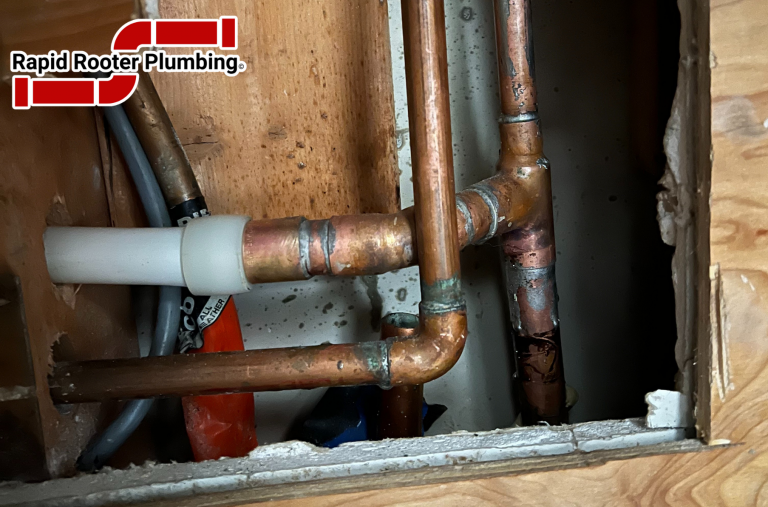
When Arizona homeowners notice signs of water damage, like damp floors, rising water bills, or musty odors, the first question is usually: “Do I have a plumbing leak, or is it something worse… like a slab leak?”
Both types of leaks require prompt attention, but they’re very different issues with different causes, symptoms, and repair approaches. Understanding the difference can help you protect your home and avoid costly long-term damage.
A plumbing leak is any unintended water loss from the pipes or fixtures inside your home. These leaks can occur:
Under sinks
At toilets
In showers or bathtubs
At water heaters
Inside walls
In laundry rooms
At supply line connections
Loose or worn fittings
Failing shut-off valves
Corroded pipes
High water pressure
Damaged supply lines
Aging fixtures
Visible dripping
Water stains on walls or ceilings
Damp cabinets or flooring
Mold or mildew near fixtures
Running toilet or noisy faucets
These leaks are usually easier to locate and repair because they occur above the slab and within accessible plumbing.
A slab leak is a leak in the water lines that run under your home’s concrete foundation. These underground lines can develop cracks or pinholes, allowing water to escape beneath the slab.
Slab leaks are more complex, more serious, and often more expensive to repair because they’re harder to locate and can damage the home’s foundation if ignored.
Pipe corrosion from Arizona’s hard water
Pipe expansion during temperature changes
Soil shifting or settling
Poor installation or weakened materials
Aging copper or galvanized piping
Hot spots on the floor
Water coming up through grout lines or baseboards
Sound of running water when no fixtures are on
Unexplained high water bills
Cracks in walls, tiles, or flooring
Moisture or mold appearing along the foundation
Slab leaks require specialized detection tools like thermal imaging, acoustic listening devices, and pressure testing.
| Feature | Plumbing Leak | Slab Leak |
|---|---|---|
| Location | Inside walls or fixtures | Under concrete foundation |
| Severity | Varies (usually moderate) | Often severe, structural risk |
| Repair Difficulty | Easy to access | Hard to access, requires specialized tools |
| Signs | Visible drips, stains | Hot floors, foundation moisture, high bills |
| Risks | Mold, water damage | Foundation cracking, major structural issues |
| Repair Methods | Tightening, replacing lines, valve repair | Rerouting, epoxy lining, tunneling, or jackhammering |
If you notice any of the following, contact a licensed plumber immediately:
Water pooling around the foundation
Flooring that feels warm
Frequent leaks throughout the house
Sudden spikes in water usage
Musty smells with no clear source
Water pressure dropping unexpectedly
Early detection can prevent thousands of dollars in damage.
Our technicians use advanced tools to accurately diagnose both plumbing leaks and slab leaks:
Camera inspections
Acoustic leak detection
Thermal imaging
Pressure testing
Moisture mapping
Depending on the situation, we offer:
Targeted pipe repairs
Rerouting lines above the slab
Spot repairs under the slab
Full pipe replacement for failing systems
We always provide clear, honest options so you can choose the solution that fits your home and budget.
Keep your plumbing in peak summer shape with our Rapid Rooter Membership Program, offering:
Priority Scheduling – Skip the wait during busy summer months.
Annual Multi-Point Plumbing Inspection – Spot leaks before they drive up your bill.
Bi-Annual Drain Cleaning & Inspection – Maintain smooth flow during high-use seasons.
Semi-Annual Water Heater Flush – Keep your system running efficiently.
Exclusive Discounts – 10% off all repairs, and up to $300 off major installs.
24/7 Emergency Service – No extra charge for nights, weekends, or holidays.
Satisfaction-Backed Service Guarantee – Confidence in every job.
Transferable Coverage – Moving within our service area? Your membership moves with you.
No Hidden Fees – Clear pricing, every time.
In Arizona, hard water means more frequent maintenance. Flushing your water heater every 6 to 12 months can dramatically extend its life, improve efficiency, and keep your water clean and reliable.
If it’s been a while since your last service, or you’ve started hearing rumbling from your tank, schedule a professional flush with Rapid Rooter Plumbing today.
📞 Call/Text: (623) 581-0346
🌐 Visit: www.RapidRooterAZ.com
📍 Serving Phoenix, Glendale, Peoria, Surprise & the West Valley